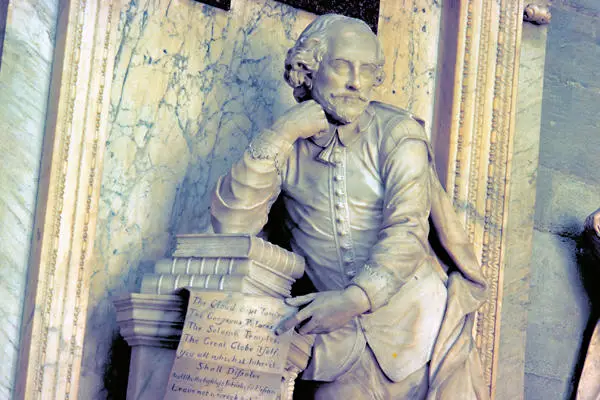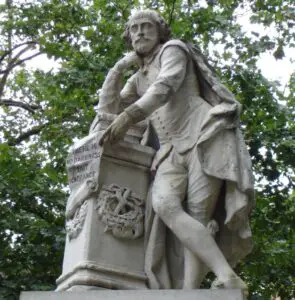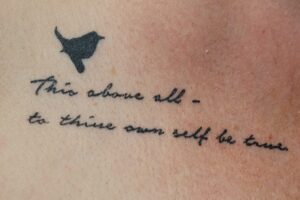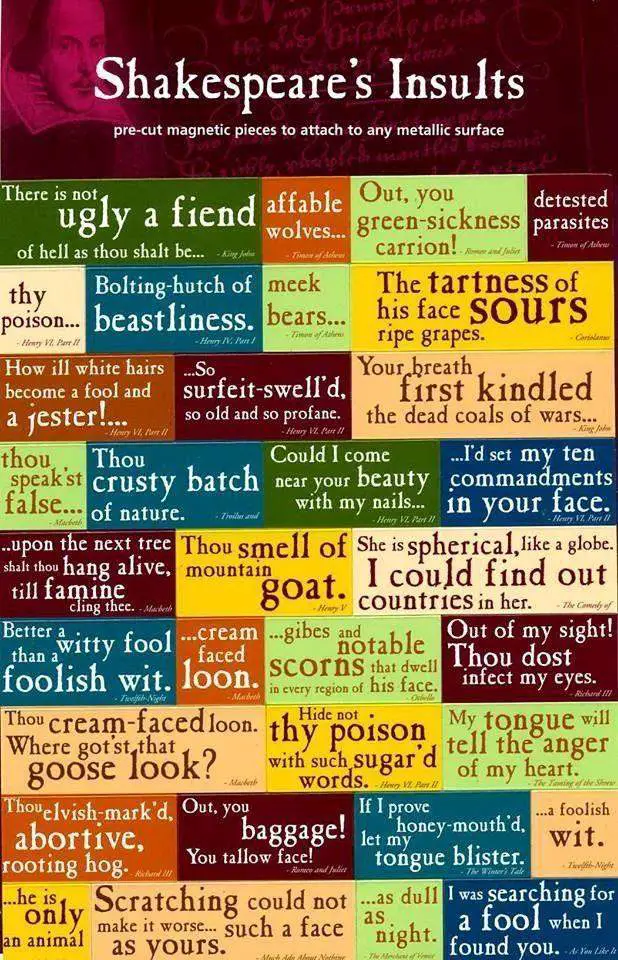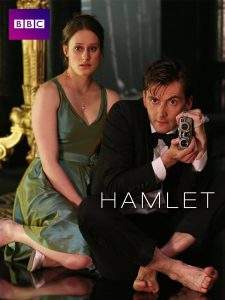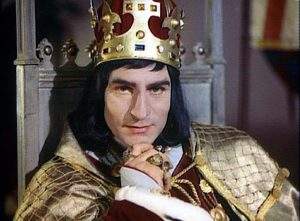Favorite Shakespeare quotes shared during the month of April are a great way to celebrate Shakespeare’s birthday.
Despite the controversy and rumors surrounding authorship of the folio, Shakespeare’s plays and sonnets span the centuries. As Ben Jonson wrote, Shakespeare “was not of an age, but for all time.” That the plays and sonnets have stretched into modern times, and still have the power to move the young and young at heart, signifies Shakespeare’s influence, an almost supernatural talent for evoking passion, longing, desire, ambition, and rage, through the simple medium of the written word.
It’s difficult choosing favorite Shakespeare quotes from the vast body of work, but as we celebrate Shakespeare’s birthday, we can at least offer a few beloved quotes and lines.
Our hearts and gratitude are with the bard; a playwright whose life and abilities were anything but simple.
First, Do you want to know a secret?
You can find a secret to reading Shakespeare and understanding the text in Act III, Sc. 2 of “Hamlet” when Hamlet tells the players: “Speak the speech, I pray you, as I pronounced it to you, trippingly on the tongue.” This is a secret to understanding Shakespeare’s language as you read. Speak the text aloud as you read.
Favorite Shakespeare Quotes
Romeo and Juliet, Act II, Sc. 2
Romeo, Romeo! wherefore art thou Romeo
Who among us hasn’t suffered a desperate, heart-wrenching teenage crush? But in modern times, instead of leaning out over a balcony, we’d be sitting by the phone or computer screen, waiting for a call, text, or email and saying, Dude, what the heck?
Seriously, to put the line in context, Juliet here is asking Romeo not where he is, but why. Why does he have to be of a forbidden clan? She proceeds to ask him to deny his family to be with her, and if he won’t, she will deny her own.
Well, we all know how well that worked out.
~Angie Dilmore
Sonnet 18
Sonnet 18 is most well-known for its famous opening line, “Shall I compare thee to a summer’s day?” It’s a favorite of young lovers, for in it the poet promises that his sweetheart’s beauty will never fade because his words will provide a lasting testimony to it. A lovely sentiment to be sure, but the sonnet speaks to much more than love or beauty. It speaks to legacy. The last two lines are my favorite:
So long as men can breathe or eyes can see,
SONNET 18
So long lives this, and this gives life to thee.
These words resonate with me because they speak to the power of self-expression. In this sonnet, Shakespeare gives voice to every artist’s heart. From the cave dwellers to the Egyptian pharaohs, from local graffiti artists to the nearly 180 million bloggers around the world, we all have the desire to make a lasting impression.
Every individual with a pen, a palette, or a piano longs for the opportunity to share her voice with the world, to give her creative spirit wings and watch it soar above the monotony of everyday life. With each chapter, lyric, and brushstroke, we anticipate that moment when we can write on history’s wall: I was here.
That’s why we continue to strive in the creative process–not so our names will appear in a font as bold and elegant as Shakespeare’s, but simply to experience the satisfaction of scribbling it somewhere on the same page.
~Vickie Price Taylor
Sonnet 73
That time of year thou mayst in me behold
When yellow leaves, or none, or few, do hang
Upon those boughs which shake against the cold,
Bare ruin’d choirs, where late the sweet birds sang.
In me thou seest the twilight of such day
As after sunset fadeth in the west,
Which by and by black night doth take away,
Death’s second self, that seals up all in rest.
In me thou see’st the glowing of such fire
That on the ashes of his youth doth lie,
As the death-bed whereon it must expire
Consumed with that which it was nourish’d by.
This thou perceivest, which makes thy love more strong,
To love that well which thou must leave ere long.
This is my favorite Shakespeare sonnet because it so beautifully captures how we all slide towards death, and the braveness of loving each other even though we must eventually lose each other… because of the amazing use of assonance…because just reading it gives me chills…because the sonnet is perfect, utterly perfect.
~Catherine Warren, Guest Contributor
Hamlet, Act I, Sc. 3
This above all: to thine own self be true,
And it must follow, as the night the day,
Thou canst not then be false to any man.
It does not matter that these words were spoken by a prattling old man, or that they were folded in to a somewhat humorous scene as a young man attempts to free himself from his father’s good natured but overbearing advice on his return to a foreign country. It also doesn’t matter that the person who speaks these words will soon be dead, his daughter will follow in death quickly thereafter, and his son – to whom the advice is directed – will be the manipulated instrument of destruction meted out on the royal family of Denmark, beyond what is planned or expected.
But while “Hamlet” remains one of Shakespeare’s masterpieces, the context of these words is not all that matters. The heart of the words almost transcends their placement in a play. What matters even more deeply is that these words ring true no matter who speaks them, and they ring true no matter who embraces them; they are not heroic words spoken in a moment of passion or of revealed clarity. They are simple words, spoken by a father to his son, but they speak to all of us. No explanation needed.
~Sharon Browning
The Insults
Hamlet, Act II, Sc. 2
Ophelia loves Hamlet, and Hamlet seems to feel the same, and tells her so in a letter. But his passion suddenly wanes, and the crestfallen Ophelia passes the letter to her father, Polonius. Polonius is in fact the culprit behind Hamlet’s reversal of feeling, having told his daughter, “Lord Hamlet is a prince out of thy star…” and orders her to ignore his attentions. The rejection drives Hamlet into melancholia, thus giving Polonius the evidence he needs to prove the Prince’s madness.
Besides the machinations of a dysfunctional court, we’re left with the letter Hamlet writes when things are still promising, and a girl, princess or otherwise, couldn’t receive a more lovely set of lines:
Doubt thou the stars are fire;
Doubt that the sun doth move;
Doubt truth to be a liar;
But never doubt I love.
It’s classic Shakespearean metaphor, with all the grandness of earth and heaven to bolster an all too-human frailty like love. The lines have a certain ring to them, and seeing The Princess Bride recently, I thought of Hamlet’s clear headed, and sublime lines. In William Goldman’s parable of star-crossed love, Westley, the low-born farm boy, wants to marry Buttercup, but must first leave in order to make his fortune in the world. On his leave-taking, Buttercup is distraught:
—I fear I will never see you again.
—Of course you will.
—But what if something happens to you?
—Hear this now: I will always come for you.
—But how can you be sure?
—This is True Love. You think this happens every day?
It’s the pared-down, vernacular version of Hamlet’s sentiment, and in its own way, nearly as lovely. And perhaps Shakespeare’s poem-within-a-love-letter-within-a-play, had a role in inspiring Goldman’s meta-fictional courtly tale of love.
Ah, indeed – Shakespeare at his finest.
~Lauren Alwan
Titus Andronicus, Act I, Sc. 1
Tamora, a Goth, has been taken prisoner by the victorious Roman General, Titus Andronicus, who as a matter of tradition, murders his prisoner of war–Tamora’s dear son.
Tamora’s disposition is shattered, but the prospect of revenge spurs an ill-fated recovery. Seducing the new Emperor Saturninus, and becoming Empress, Tamora assumes an air of truce and reconciliation in order to placate the Andronicus family and better wreak her vengeance upon them. In a moment that reveals Tamora’s sheer ruthlessness, with a smile and reprimanding disposition, she imports the Emperor to be kind and even-handed with Titus and his family. She then shares, in an aside to Saturninus alone, her secret blood-curdling intentions:

I’ll find a day to massacre them all
And raze their faction and their family,
The cruel father and his traitorous sons,
To whom I sued for my dear son’s life,
And make them know what ’tis to let a queen
Kneel in the streets and beg for grace in vain.
~John Zic
Richard III, Act 5, Sc. 4
Last Words
Richard III, after his cruel ascension to the throne, is about to be avenged by the Earl of Richmond’s soldiers and, finally in a panic, very far removed from his cold, calculating self, Richard III cries his last words:
A horse. A horse. My kingdom for a horse.
Happy Birthday, Will! (or Emilia, as the case may be).
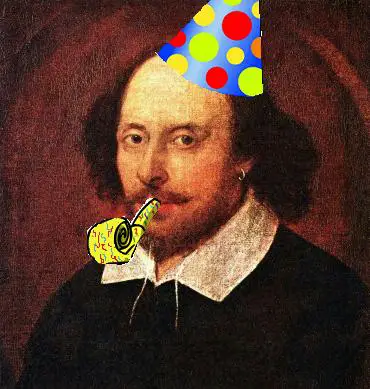
Read more about Shakespeare in our post “Reinventing Shakespeare: Why His Stories are Timeless,” and in our post “For the Love of Shakespeare.”
Read more about Shakespeare at the Folger Shakespeare Library, and then read about Emilia Bassano at the Atlantic in the article “Was Shakespeare a Woman?“
As an Amazon affiliate, LitStack may earn a commission at no cost to you when you purchase products through our affiliate links.

